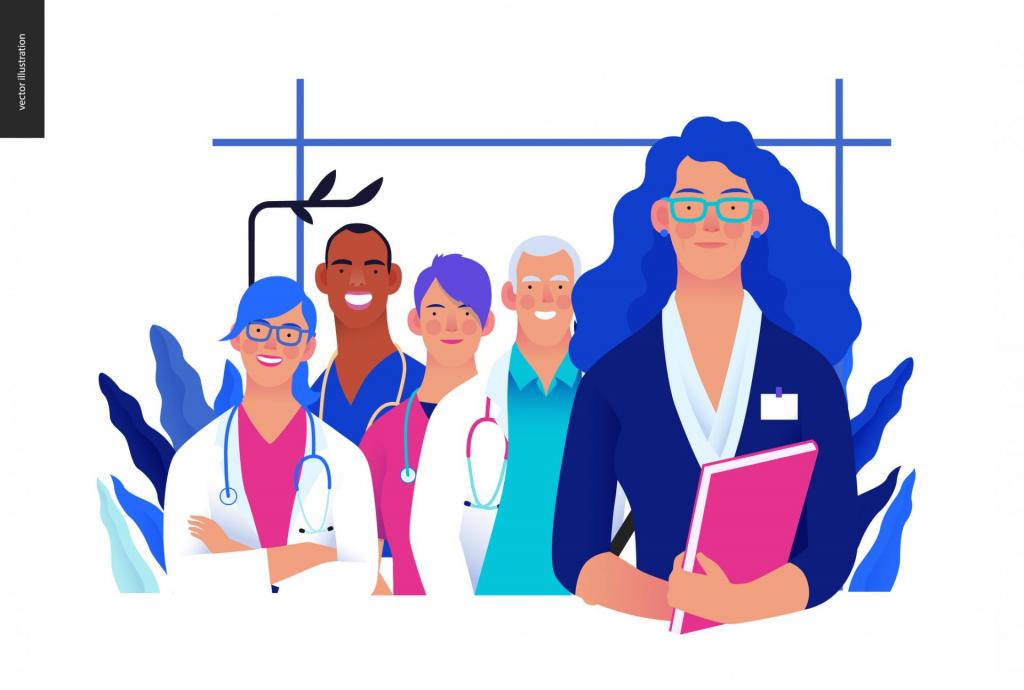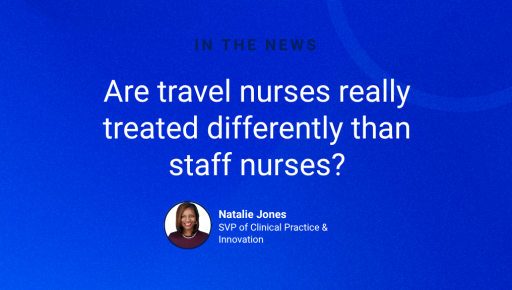Updated April 5, 2024
Allied health professionals have a wide range of job titles, each one related to health in their own unique ways. They don’t deal so much with medical responsibilities like doctors and nurses. Rather, these jobs focus on the identification and evaluation of diseases and other disorders, nutrition services, rehabilitation, and health systems management, to name a few of the responsibilities they cover. There are approximately 5 million allied healthcare workers in our country and experts estimate that these varied roles make up as much as 60% of the healthcare workforce in the United States.
If you are interested in entering the field of allied health, you are in good company. Below is a list of some of these important roles, along with their qualifications and average salaries. Who knows? One of them might be perfect for you. You can find out by visiting Prolink, where we can point you in the direction of the allied role that fits with your personality, career ambitions, and salary goals.
Physical Therapist
Physical therapists are needed to help those who have suffered injuries and illnesses and who now face functional problems on account of those issues. This allied health role is focused on helping to relieve pain and discomfort by developing plans to improve mobility and prevent future problems. Treatment by physical therapists (or PTs) can include specialized exercises, stretching, and hands-on techniques, among others.
To become a physical therapist, you must complete a Doctor of Physical Therapy program (DPT). You then need a license before you can practice at a hospital or other medical facility. The average salary for a PT in the United States is $97,720, with most making $46.98 per hour.
Cardiovascular Technologist
A cardiovascular technologist performs diagnostic tests to assess conditions that affect the lungs and heart. As a cardiovascular technologist, you will consider a patient’s medical history and conduct tests like electrocardiograms or EKGs. You’ll maintain and operate sophisticated imaging equipment like vascular sonography and record the results using digital recordkeeping systems.
To qualify for this allied health care role, you need a minimum of an associate degree. The average salary for a cardiovascular technologist in the U.S. is $78,210, with most making $37.60 an hour.
Community Health Worker
Community health workers serve as conduits between the community and health care, social service systems, and the government. As a community health worker, you would help families and other groups access health care resources, such as insurance, housing, food, and quality health care information. Your primary role is to educate community members about wellness and disease prevention through the adoption of healthy behaviors and lifestyle choices.
To qualify as a community healthcare worker (CHW), you need a bachelor’s degree in a health-related field along with on-the-job training or certification. The average salary for a CHW in the U.S. is $46,190 per year or $22.21 per hour.
Anesthesiologist Assistant
As an anesthesiologist assistant, you would work with physicians to provide anesthetic care to patients. This allied health role requires a background in biological sciences and an understanding of various medications.
To qualify for this role, you need a master’s degree and certification. The average salary for an anesthesiologist assistant, as well as any other kind of physician's assistant, is $126,010 a year or $60.58 per hour.
Cytotechnologist
When a tissue or blood sample is collected from a patient, a cytotechnologist will prepare the sample by placing it on a slide before viewing it under a microscope. This allied healthcare professional will then record their findings and communicate the findings to a pathologist for a final diagnosis.
Like most laboratory professionals, cytotechnologists are expected to have a bachelor’s degree. However, the requirements for this allied health job title vary by state and employer. The average salary for cytotechnologists is$57,380 per year or $27.59 per hour.
Speech-Language Pathologist
A speech-language pathologist works with individuals to treat and prevent issues with speech, swallowing, and language. They also work with adults and children to manage hearing loss issues and Parkinson’s disease. Your daily routine might be spent conducting assessments and creating customized treatment plans for the patients in your care.
To qualify as a speech-language pathologist, you need a minimum of a master’s degree and to be licensed in the state where you operate. The average annual salary for this allied health care job role is $84,140 or $40.45 per hour.
Associate Laboratory Microbiologist
An associate laboratory microbiologist prepares test samples and performs examinations for the purposes of scientific exploration. These allied health professionals also perform analyses, record data, review their findings, and collaborate with other scientists before producing reports and sometimes presentations.
To qualify as an associate laboratory microbiologist, you need a master’s degree from an accredited university and four years of laboratory experience or a bachelor’s degree with a specialization in technology or one of the sciences and six years of laboratory experience at the technologist level. The annual average salary for this allied health care role is $81,990 per year or $39.42 per hour.
Ambulance Technician
An ambulance technician is also referred to as an emergency medical technician or EMT. This allied health job role works in ambulances and responds to emergency medical situations, such as people having heart attacks or multi-vehicle accidents on the highway. EMTs are trained in skills that help them provide immediate lifesaving care for patients in a variety of on-scene scenarios.
To qualify as an ambulance technician, you need an associate degree or training program certificate along with a state license and CPR certification. The salary for the role of an EMT in the United States is $39,410 per year or $18.95 per hour.
Blood Bank Technology Specialist
Blood bank technology specialists work in blood banks and other medical centers, such as laboratories, transfusion services, and research facilities. Their job responsibilities include performing blood tests, investigating harmful responses of the body to blood transfusions, and supervising the collection and delivery of blood components.
To qualify for this allied health care role, you need a bachelor’s degree with a major in microbiology, biology or physical science with a certification as a medical technologist. The annual average salary of a blood bank technology specialist, as well as other clinical laboratory technologists, is $57,380, which comes out to $27.59 an hour.
Cardiopulmonary Rehabilitation Specialist
A cardiopulmonary rehabilitation specialist works with patients who have been diagnosed with heart and lung diseases. They help to improve quality of life by educating patients about their conditions and by identifying risk factors such as smoking, hypertension, and poor diet. They then suggest medical treatments and lifestyle changes to help reduce health risks.
To qualify as a cardiopulmonary rehabilitation specialist, you need a bachelor’s degree in physical therapy, kinesiology, or a related field, though some employers prefer candidates with a master’s degree or certification in certain areas, such as occupational therapy. The median salary in the United States for this allied health care role, as well as that of other physical therapy specialists, is $57,000.
Athletic Trainer
Athletic trainers are responsible for managing injuries and illnesses suffered by those who play competitive sports. They may find themselves taping wrists and ankles or creating an injury prevention plan. Athletic trainers also collaborate with other health care providers, and they are usually first on the scene when an athlete becomes injured.
To qualify as an athletic trainer, you need a minimum of a bachelor’s degree and the appropriate certification. The annual salary for an athletic trainer in the United States is $53,840 a year.
Nuclear Medicine Technologist
When you become a nuclear medicine technologist, you find yourself working closely with patients who are undergoing imaging procedures like PET (positron emission tomography) scans. You would also educate patients on what to expect during their exams, operate the imaging equipment, maintain detailed records, and administer radiopharmaceutical injections.
To qualify for this allied health care role, you need a minimum of an associate degree. The average annual salary for a nuclear medicine technologist is $85,300, which comes out to $41.01 per hour.
Audiologist
Audiologists work with patients who have trouble with balance and who require cochlear implants. They also recommend strategies for people with extensive hearing loss, such as lipreading.
To qualify as an audiologist, you need a doctoral degree in audiology along with the appropriate licensure. The average annual salary for an audiologist is $82,680 or $39.50 per hour.
Diagnostic Medical Sonographer
A diagnostic medical sonographer helps to guide needles during a biopsy and diagnosis conditions that affect the internal organs. These allied health care professionals also prepare, operate, and maintain the equipment during diagnostic tests. They will then provide a summary of their findings to the physician.
To qualify for this allied health position, you need at least a postsecondary certificate. The annual salary for a diagnostic medical sonographer in the U.S. is $78,210.
Dietician
A dietician assesses a patient’s nutritional and health needs and provides education on how to adopt healthier eating habits. They document a patient’s progress and help patients overcome barriers that are hindering their progress. As a dietician, you may also find yourself speaking to groups about nutritional issues with the goal of promoting better health.
To qualify as a dietician, you need a bachelor’s degree and the appropriate certification. Some employers prefer applicants that have Registered Dietician Nutritionist (RDN) certification. The average annual salary for dieticians in the United States is $66,450 or $31.95 an hour.
Dental Hygienist
A dental hygienist works closely with dentists and is considered an expert on oral health. As a dental hygienist, your days would be spent cleaning teeth, taking dental X-rays, and applying sealants, among other responsibilities.
To qualify as a dental hygienist, you need to complete a three-year associate degree program before securing mandatory licensure. The average annual salary for a dental hygienist in the U.S. is $81,400 a year or $39.14 an hour.
Lactation Consultant
When new mothers don’t have enough milk to support their growing babies or experience pain while nursing, a lactation consultant comes to the rescue. These allied health care professionals act as educators for new mothers and families and are often employed at clinics, hospitals, and birthing centers.
To qualify as a lactation consultant, you need to obtain certification through the IBLCE (International Board of Lactation Consultant Examiners). The average annual salary for lactation consultants in the United States is $92,851.
Looking for a Job as an Allied Health Professional?
The above list is a small cross-section of the many roles you can adopt as an allied healthcare worker. There are over 80 professions and 200 careers available in the field of allied health.
If you are interested in one of these exciting career positions, apply today by visiting Prolink. We provide staffing solutions for allied health professionals across the country. We have relationships with hospitals and other medical facilities that need allied health care staff to provide quality patient care. We offer services to ensure you are licensed and able to practice at the destination of your choice and even equip you with the tools you need to succeed. Get started by conducting an allied health job search.









